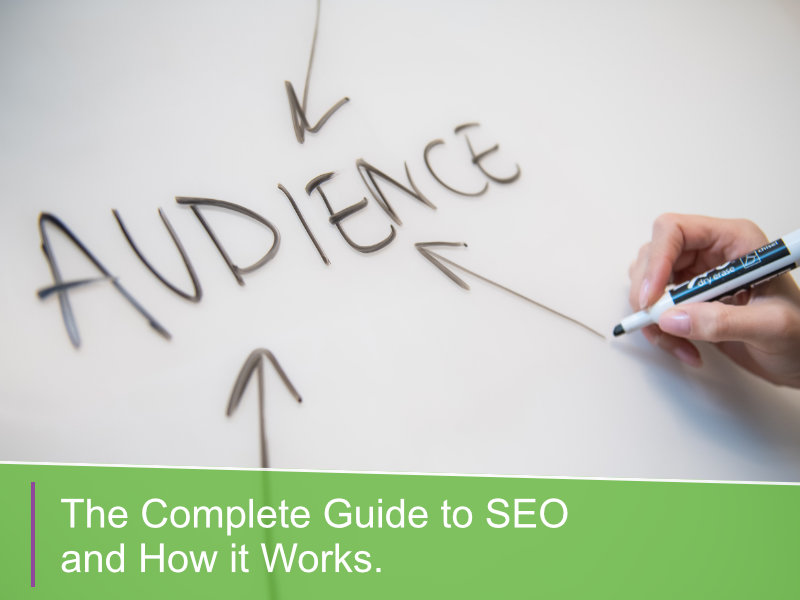
Search engine optimization (SEO) is the process of getting a website to rank higher in search engine results pages. It is a long-term strategy that requires patience, research and dedication.
The ultimate goal is to make sure that your website has enough authority to rank high in search engines such as Google or Bing.
SEO has become a very important part of marketing and advertising for any company.
What is SEO?
SEO works to improve a website’s ranking in the search engine results pages (SERP) for specific keywords or keyword phrases. The goal is to increase the quantity and quality of traffic to your site from the search engines, ideally resulting in higher conversions.
SEO changes frequently and in small ways, but can be broken down into three key components or pillars that you need to be familiar with and action regularly:
- Technical Optimization is the process of completing activities on your site that are designed to improve your SEO, but are not related to the content on your site. This is often about making sure your site is optimized for mobile, and that the images used on your site have alt tags allowing screen readers to describe them (amongst other things).
- On-Page Optimization is the process of ensuring that your content is relevant and provides a great user experience. This includes targeting the appropriate keywords within your content.
- Off-Page Optimization is the process of enhancing your site’s search engine rankings through activities that take place outside of your website. This is largely achieved by having other sites backlink to yours, which helps build your site’s reputation.
How do search engines really work?
In order to understand why SEO matters we need to look at how a search engine decides what to show when someone searches for something. Algorithms in the background look for clues to give you the exact result you are looking for. The search engines rely on these algorithms to find a web page and decide which ones to present for any given keyword.
Search engines crawl websites, index them, and then rank them according to relevance. To give you some context, lets break those steps down:
Step 1: The Crawling
Web crawlers scour the internet looking for new pages and record the information found on them. The main purpose of this is to discover that a new page exists, but also to see if a page they have previously visited has been changed or updated.
When a search engine crawls a page, it follows links it has previously discovered. If you have a new page that’s linked from your homepage and a search engine crawls that page, it will then look to see if there’s another link to follow and may use the link to your new page.
Step 2: The Indexing
This is where the search engine decides whether or not it is going to use the content that the crawler has found. If the content on that page is deemed worthy by a search engine it will be added to its index, where it can be later retrieved. If your content is duplicated, considered low value or spammy, or the page could not be crawled, your page won’t be indexed.
Step 3: The Ranking
This is probably the most important step. Once your site has been crawled and indexed, it will then be ranked. This is where those three pillars of SEO come into play. There are more than 200 signals that search engines use to determine your page’s rank, and they all fit under those pillars.
How can you ensure your site ranks well?
Now we have an understanding of how the search engines index web pages, let’s look at the important elements you should be including on your pages to ensure they rank highly.
Keywords
When SEO first came about, through Google’s page rank algorithm, keywords were the only technique that mattered. “Keyword stuffing” (the practice of using as many keywords as possible on a page and often out of context), in order for it to rank well, became common. This leads to a negative user experience resulting in Google changing their algorithm. Today, keywords must be well researched, carefully chosen and used with good judgement in your content in order to be most effective.
Content
Probably the most vital part of SEO, your content must be educational, interesting, relevant and shareable. A number of different forms of content contribute to your site rank, including; the content on the web page itself, videos, blogs, and infographics, as well as whitepapers and e-books.
Your content is the vehicle you use to reach and engage audiences. Ensuring it is tailored to your audience and relevant is key.
Off-Site SEO
This refers to activities that take place outside of your website, rather than on it.
Backlinks are especially important for SEO because they represent votes of confidence from one site to another. They act as a signal to the search engine crawlers that others vouch for the quality of your content. If many websites link to the same webpage, search engines can infer the value of that webpage and therefore rank it accordingly.
Obtaining these links is known as link earning or link building, and some backlinks are far more valuable than others. Backlinks from trusted, popular, high-quality websites are considered the best links to earn, while a backlink from a low-quality, possibly spammy site is usually at the opposite end of the spectrum. Even just being mentioned on a high-quality website can give your brand a boost.
The choices you make when linking to an external site add value as well. A lot of research needs to go in to deciding where you want to link to, to ensure you’re getting the maximum impact.
Local SEO
This is becoming increasingly important. Around 60% of searches these days are performed on a mobile device, and around half of those have local intent.
So, let’s say you own a restaurant. Local SEO would ensure that when people visiting your area are looking for the best restaurants in town they will come across your site.
Local SEO best practices include claiming local directory listings, creating location specific pages for your site, creating pages for your business on Google My Business local directory and Google Maps, and optimizing your website for local searches.
Why is all of this actually important?
Ranking high on search engines is no longer optional – it’s crucial; 75% of web users never click past the first page of a search, so the more effective your SEO efforts and the higher your ranking, the better your visibility!
The number 1 organic spot (below the Ads) on a Google search gets nearly 32% of clicks, and moving up by just one spot can increase your click through rate by 30.8%!
Another reason SEO is critical relates to all the time you put into generating great content and the on-page SEO optimization which improves the user experience on your site. Taking the steps to make sure your website is responsive will make it usable for your mobile visitors, as well as people on a laptop or desktop, for example.
Probably the key benefit of SEO is that it’s free. Unless you choose an agency to help you with it – and there are many out there – you can do all of this yourself. As mentioned at the start, it just takes a bit of patience, hard work and dedication!
We Add Meaning and Remove Noise.
We don’t just build websites; we develop innovative concepts and experiences for our clients. If all of this is too much for you, we offer one of the best SEO services in Bakersfield. Contact our team today to see how we can help you.

